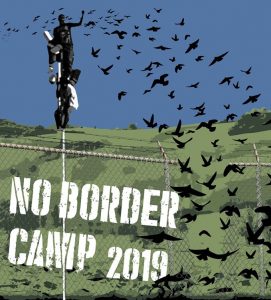 1. One of the core beliefs of every fight for social justice is that the people that are directly affected by these oppressions should be at the forefront of that struggle.
1. One of the core beliefs of every fight for social justice is that the people that are directly affected by these oppressions should be at the forefront of that struggle.
Coming from an environment in the Netherlands where the majority of the people involved in “no border activism”*** are from Western countries, and thus mostly not people who had to confront with their bodies the border system, we felt the need to discuss among ourselves what does it mean to do “no border activism” in this context, what are the dynamics that bring and brought to this situation and what are the practices to overcome these limitations?
***(We mean here by no border activism struggles that are mostly carried on by groups and people related to an anti-authoritarian, extra-parliamentary left. We do not think that these enclose all the struggles ongoing against borders, but we’re gonna use this term for simplicity)
We want to use this reflection session as an opportunity to discuss on these issues and think of possible solutions. Hereafter are some points of reflections to help the discussion
2. We acknowledge the existence of a long-lasting gap in the No Border Activism in the Netherlands between traditional western activists and the migrant communities. We believe that there are many reasons for the existence of this gap.
- The interiorized categorization that leads leftists to view political migrants as refugees in need of help and not as political subjects, or the reluctance to create bridges of real solidarity (thus as an occasion for mutual learning and support) for struggles of political migrants that are not 100% in line with one’s own ideology.
- The systematic pressure exercised by the “integration” policies, the effects of racist conditions, language barriers and social isolation experienced by migrant people.
By the above-mentioned factors the groups are ultimately separated from each other and the mutual ignorance and prejudices are maintained or strengthened by missing points of contact.
3. We realize that the question on how to involve migrants communities in ‘traditional western no border activism’ relies on problematic assumptions, implicitly stating that “they” need to come to “us”, assuming that they are not already resisting and fighting.
4. The Netherlands is perceived as a country far away from the border, it is not a European Union border country nor a transit area, but rather an end destination. (This of course doesn’t mean that people don’t die in The Netherlands because of border policies or that people oppressed by the border system are not faced with day-to-day problems) At the same time though, the Dutch state not only plays a big role in European border policies, it also has a big influence in destabilizing countries where migrants come from.
Given that the gap between our communities exist, in the context we are situated in, what can we do to establish better connections to each other? How to care for each other? We would like to reflect on practices to accomplish this.
